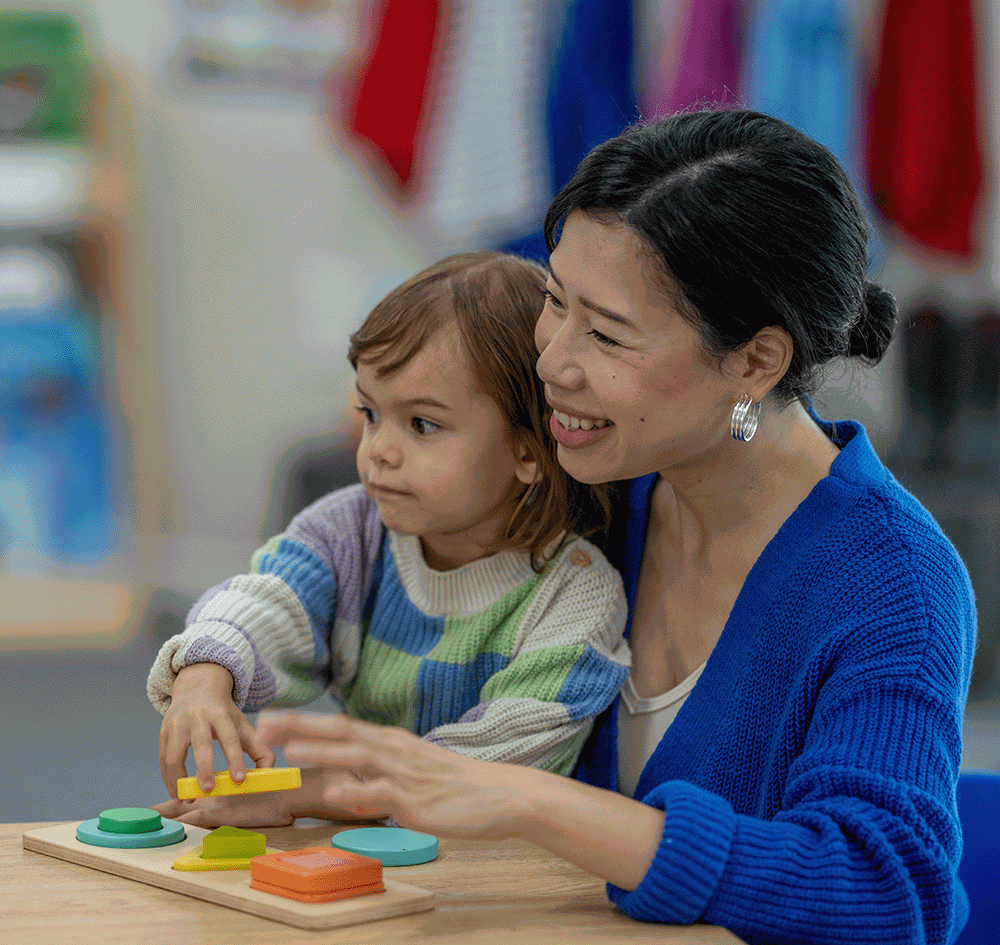Posted: November 12, 2024
Early relational experiences between children and caregivers that are safe, stable, and nurturing relationships (SSNRs) lay the foundation for healthy development. Learn what safe, stable, and nurturing relationships look like in the early childhood setting.

A caregiver sitting with a young toddler on their lap, both interacting with a shape puzzle.
"Relational experiences during infancy and early childhood are key drivers for building health, social emotional development, and learning capacities, each vital for well-being" (Willis and Eddy, 2022, p. 361).
Early relational health is a strength-based framework focusing on safe, stable, and nurturing relationships (SSNRs) between children and caregivers. SSNRs are at the heart of caring for young children. When caregivers interact with infants, toddlers, and young children in caring and responsive ways that build relationships and trust, it lays the foundation for healthy development.
Safe, stable, and nurturing relationships include:
- providing young children with the security to know that they are protected and safe with their caregivers
- being present and dependable in young children's lives
- consistently and sensitively meeting young children's social-emotional and developmental needs
Early relational experiences are pivotal in buffering the effects of stress. Developing and sustaining safe, stable, and nurturing relationships with young children boosts their ability to combat adversity and supports children's development of adaptive skills essential for managing challenges and adversity as they grow and develop.
"Early relational experiences can influence such aspects of children's social-emotional development as emotion regulation, emotion knowledge and expression, and prosocial behavior" (Li and Ramirez, 2023, p. 17).
The capacity for educators to grow strong relationships with children is critical as children develop social-emotional learning skills that support their ability to understand emotions. SSNR's create a strong foundation for children to learn about:
- their feelings and the feelings of others
- ways to manage emotions
- how to help and care for others
- how to form friendships and interact with others in kind and caring ways
What do safe, stable, and nurturing relationships look like in the early childhood setting?
An infant teacher holds, talks with, and maintains eye gaze with an infant as the infant coos to her. The infant feels safe with her caregiver.
A toddler teacher comforts and hugs a crying child as the teacher talks calmly with the toddler. The toddler has a safe and stable adult in her life that he can trust.
A teacher of 3-year-olds greets and talks with children daily about how they feel as they enter the classroom and throughout the day. The children learn about feelings and how to share their feelings with this caring and responsive educator.
A pre-k teacher consistently and intentionally has conversations with children throughout the day about their experiences and interests that help guide classroom activities. Children know their thoughts and voices are heard, respected, and valued and can share freely in a safe and caring relationship and community.
The relationships ECE professionals have with children are an impactful part of children's early relational experiences. When educators foster safe, stable, and nurturing relationships with young children, they support children's overall healthy development and contribute to children's learning, growth, and feelings of security.
References
Li, J., & Ramirez, T. (2023). Early Relational Health: A Review of Research, Principles, and Perspectives. The Burke Foundation.
Willis, D. W., & Eddy, J. M. (2022). Early relational health: Innovations in child health for promotion, screening, and research. Infant Mental Health Journal, 43, 361–372.

